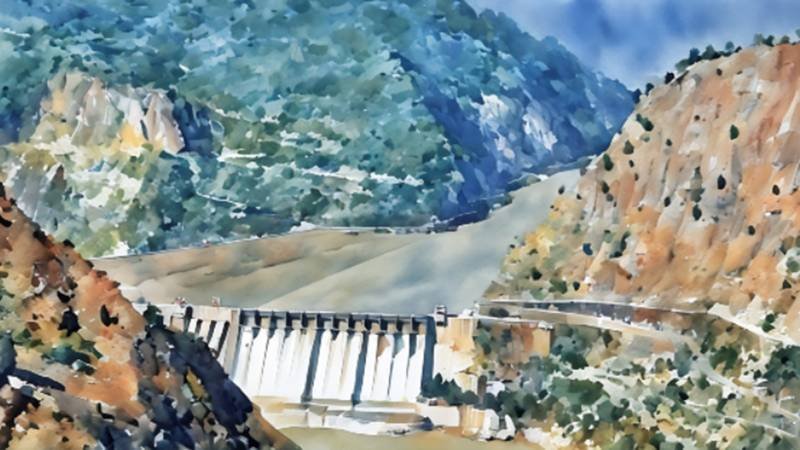Weaponising Water: India’s Indus Treaty Suspension And The Threat To Pakistan’s Security
Ezba Walayat Khan
3 June 2025


Former World Bank Vice President Dr Ismail Serageldin once remarked, “If the wars of this century were fought over oil, the wars of the next century will be fought over water.” For over six decades, despite several wars and constant skirmishes, the Indus Water Treaty (IWT) served as a symbol of cooperation between the two countries. Lately, water has increasingly become a strategic tool of coercion in India’s approach towards Pakistan. By taking a menacing turn, under its self-assumed position as judge, jury, and executioner after the Pahalgam attack, India suspended the IWT.
Today, the treaty faces severe threats such as breach of international law, violation of Pakistan’s water rights, and threat to energy, agricultural, and economic stability. The suspension of the IWT is purely a product of India’s hyper-nationalism and unilateral moves. Under Article XII(3) and Article XII(4) of IWT, there are no provisions to modify or suspend the treaty unilaterally; instead, it mandates the necessity for a bilateral accord between the two countries. Further provoking Pakistan, India targeted the Neelum-Jhelum hydropower project on 7 May, 2025. India’s actions are nothing short of blatant state-sponsored water terrorism.
The IWT suspension has not been done in reprisal for the Pahalgam attack but rather reflects a long-standing effort to sabotage Pakistan’s water and energy resources. Subsequent to its unilateral decision, India lowered the sluice gates at Baglihar Dam, thereby reducing the Chenab River’s flow by 90 percent, as well as the unannounced release of water from the Uri Dam, leading to flood warnings. Additionally, after a few hours of the Indian Prime Minister’s statement, “Now, India’s water will flow for India’s benefit, it will be conserved for India’s benefit, and it will be used for India’s progress,” the Noseri Dam near the Neelum-Jehlum Power Project was targeted.
What sort of democracy authorises attacking civilian infrastructure, and which moral compass justifies such aggression? These characteristics only reflect the behaviour of a rogue state, not of a responsible regional actor.
India’s current actions are a continuation of its historical precedent. After the Pulwama incident in 2019, India declared its intent to cut off water and sought formal changes to the treaty. Moreover, its highly dubious water infrastructure and hydropower plans on Pakistan’s rivers, such as the Wullar barrage, Kishanganga and Ratle projects, violate Pakistan’s entitlements under the IWT. Regarding its apprehensions, Pakistan approached the Permanent Court of Arbitration, which marked a legal victory for Pakistan in 2023.
Most recently, following the unilateral suspension, India accelerated four under-construction hydro-power plants on the Chenab River, including Pakal Dul, Kiru, Kwar, and Ratle which are expected to be completed between 2026 and 2028. This also reflects the groundwork laid by the BJP government by issuing two notices to Pakistan in 2023 and 2024 to revise the treaty for its new projects.
As the lower riparian, Pakistan sees India’s provocations as a threat to its long-term water security. The Indus River system, sustaining over 90 percent of Pakistan’s agricultural production, remains central to its economy and livelihoods. With continued disruption of water flows, the future is now at risk, triggering cascading effects including crop failures, food insecurity, and forced migration from agrarian regions. Furthermore, it will also have repercussions for the country’s energy sector, reducing hydropower generation and impacting electricity supply.
Pakistan’s leadership has completely rebuked India’s actions as an unprovoked act of aggression. Pakistan’s Defence Minister in a statement said, “India cannot deprive Pakistan from its right to water. Any attempt to halt or diverge Pakistan’s water will be considered as an act of war.” However, the country has demonstrated restraint, which must not be mistaken for weakness. Pakistan has the capacity and intelligence to strike down India’s water infrastructure, but will not do so, out of the principled belief that water is a fundamental human right and should never be politicised. This can also result in dam warfare having serious implications for the future.
Pakistan has consistently complied with international legal frameworks, pursued arbitration and upheld verdicts, even when Pakistan is provoked. The World Bank, as a guarantor of the IWT, must hold India accountable, preventing it from setting a dangerous precedent where treaties can be unilaterally discarded and civilian infrastructure attacked under the guise of national security.
On the international front, Pakistan must intensify its diplomatic efforts and utilise legal and multilateral tools to thwart India’s unilateral actions while maintaining the treaty’s provisions. Additionally, there is a need to engage with water and human rights organisations as well as low riparian states to form a united front and attain international support for the equitable waters sharing practices. Internally, it is imperative to focus on alternative water resources like rainwater harvesting and sustainable groundwater management through data-driven oversight and real-time monitoring, leveraging technologies like satellite imagery and telemetry systems. Besides, a national assessment is crucial for long-term water security and resilience.
India’s weaponisation of water is a measured act against Pakistan to use shared rivers as coercive instruments. The world should not condone the use of water as a source of power against another nation. Water is a right and should not become a means of geopolitical pressure, hence, anyone violating this principle must be held accountable.


The Centre for Aerospace & Security Studies (CASS) was established in July 2021 to inform policymakers and the public about issues related to aerospace and security from an independent, non-partisan and future-centric analytical lens.

@2025 – All Right Reserved with CASS Lahore.